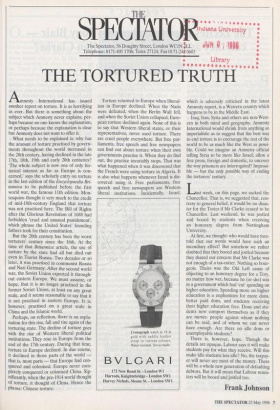The Spectator, 56 Doughty Street, London WC1N :LL Telephone: 0171-405
1706; Telex 27124; Fax 0171-241 0603
THE TORTURED TRUTH
Amnesty International has issued another report on torture. It is as horrifying as ever. But there is something about the subject which Amnesty never explains, per- haps because no one knows the explanation, or perhaps because the explanation is clear but Amnesty does not want to offer it.
What needs to be explained is: why has the amount of torture practised by govern- ments throughout the world increased in the 20th century, having declined in the late 17th, 18th, 19th and early 20th centuries? 'The whole subject is now one of only his- torical interest as far as Europe is con- cerned,' says the scholarly entry on torture in the last edition of the Encyclopaedia Bri- tannica to be published before the first world war, the famous 11th edition. Mon- tesquieu thought it very much to the credit of mid-18th-century England that torture was not practised here. The Bill of Rights after the Glorious Revolution of 1688 had forbidden 'cruel and unusual punishment', which phrase the United States' founding fathers took for their constitution.
But the 20th century has been the worst torturers' century since the 16th. At the time of that Britannica article, the use of torture by the state had all but died out even in Tsarist Russia. Two decades or so later, it was practised in communist Russia and Nazi Germany. After the second world war, the Soviet Union exported it through- out eastern Europe. We must assume, or hope, that it is no longer practised in the former Soviet Union, at least on any great scale, and it seems reasonable to say that it is not practised in eastern Europe. It is, however, practised on a great scale in China and the Islamic world.
Perhaps, on reflection, there is an expla- nation for this rise, fall and rise again of the torturing state. The decline of torture goes with the rise of Western liberal political institutions. They rose in Europe from the end of the 17th century. During that time, torture in Europe declined. In due course, it declined in those parts of the world — that is, most parts — that Europe had con- quered and colonised. Europe never com- pletely conquered or colonised China. Sig- nificantly, when the pre-1914 world thought of torture, it thought of China. Hence the phrase: Chinese torture. Torture returned to Europe when liberal- ism in Europe declined. When the Nazis were defeated, when the Berlin Wall fell, and when the Soviet Union collapsed, Euro- pean torture declined again. None of this is to say that Western liberal states, or their representatives, never used torture. There are cruel people everywhere. But free par- liaments, free speech and free newspapers can find out about torture when their own governments practise it. When they do find out, the practice invariably stops. That was what happened when it was discovered that the French were using torture in Algeria..It is also what happens whenever Israel is dis- covered using it. Free parliaments, free speech and free newspapers are Western liberal institutions. Incidentally, Israe , which is adversely criticised in the latest Amnesty report, is a Western country which happens to be in the Middle East.
Iraq, Iran, Syria and others are non-West- ern in both mind and geography. Amnesty International would shrink from anything so imperialistic as to suggest that the best way to end torture is to encourage the rest of the world to be as much like the West as possi- ble. Could we imagine an Amnesty official telling Syria to be more like Israel; allow a free press, foreign and domestic, to uncover the way prisoners are interrogated? Impossi- ble — but the only possible way of ending the torturers' century.
Last week, on this page, we sacked the Chancellor. That is, we suggested that, con- trary to general belief, it would be no disas- ter for the Tories if Mr Clarke ceased to be Chancellor. Last weekend, he was jostled and booed by students when receiving an honorary degree from Nottingham University.
At first, we thought: who would have fore- told that our words would have such an incendiary effect? But somehow we rather doubted that they booed and jostled because they shared our concern that Mr Clarke was not enough of a tax-cutter. Nothing so bour- geois. Theirs was the Old Left cause of objecting to an honorary degree for a Tory, no matter how wet, because he (or she) was in a government which had 'cut' spending on higher education. Spending more on higher education is a euphemism for more dons, better paid dons, and students receiving their higher education free. Dons and stu- dents now comport themselves as if they are nurses: people against whom nothing can be said, and of whom we can never have enough. Are there no idle dons or unemployable students?
There is, however, hope. Though the details are opaque, Labour says it will make students pay for what they receive. Will this make idle students less idle? No, the taxpay- er will never see most of the money. There will be a whole new generation of defaulting debtors. But it will mean that Labour minis- ters will be booed and jostled too.
Frank Johnson


























































 Previous page
Previous page